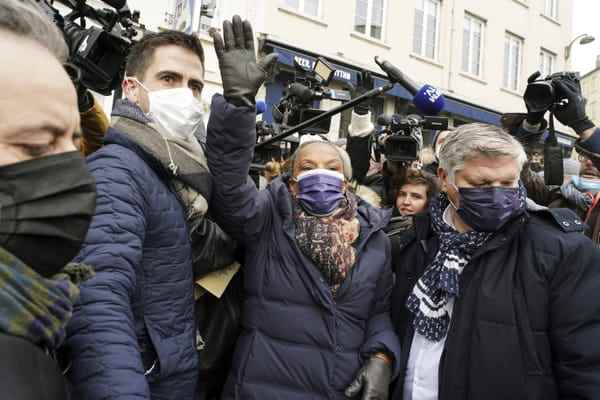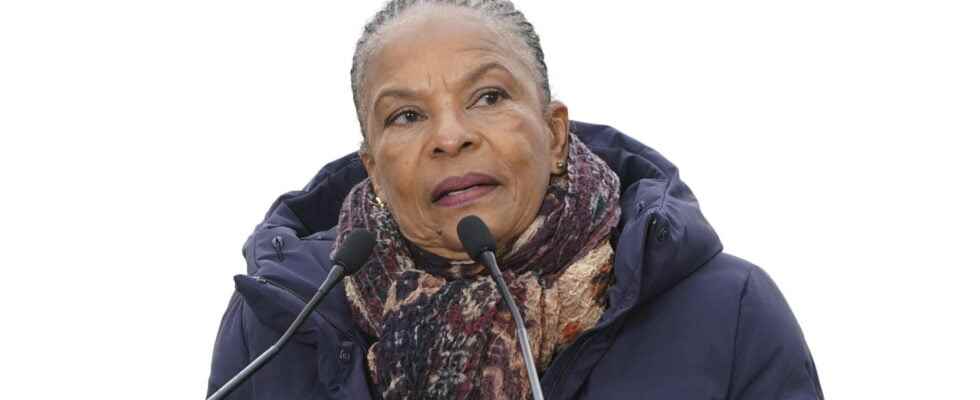TAUBIRA. Christiane Taubira is a candidate for the 2022 presidential election. Pushed for weeks to run, the former Minister of Justice finally launched herself, via the process of the popular primary. Results of polls, key points of the program, news… What you need to know about his campaign.
The essential
- Christiane Taubira is a candidate for the 2022 presidential election. The former Minister of Justice has agreed to comply with the principle of the popular primary, to which she has announced that she will submit, and whose vote will take place from January 27 to 30.
- 20 years after her first presidential candidacy, Christiane Taubira wanted to succeed in uniting the left behind her person. Despite the acknowledgment of failure, the former Keeper of the Seals remains in the race and is accused in his camp of adding division, she to whom the elimination of Lionel Jospin had been attributed in the first round in 2002 .
- In the polls, Christiane Taubira is far from competing with the right to reach the second round. According to the results of the various surveys, it is indeed given only around 4 to 5% of voting intentions in the first round.
Live
Christiane Taubira at 5% in the latest poll
January 21 campaign chronicle. 10:25 a.m. The latest poll on voting intentions in the first round of the presidential election, carried out by OpinionWay and published on Friday January 21, 2022, credits Christiane Taubira with 5% of the vote. The former Keeper of the Seals would come very far from Emmanuel Macron and the right-wing candidates, not upsetting the balance on the left any further.
Touted as the one that could have allowed the left to unite, Christiane Taubira’s candidacy for the presidential election was finally added to all those already announced. If the ambition of the former Minister of Justice was to manage to organize a common project, she faced the categorical refusal of Yannick Jadot or even Jean-Luc Mélenchon. Despite this failure, she aims to go all the way after months when her interference in the countryside appeared like an Arlesian. But far from reshuffling the cards on the left, it simply seems to vary the possible results of the other contenders, at the margin.
The arrival of Christiane Taubira makes the left react

January 17 campaign chronicle. 5:41 p.m.. Her name was already on the list of candidates for the popular primary, but since Saturday January 15 Christiane Taubira has formalized her entry into the presidential race. Only, before claiming the Elysée Palace, the former Minister of Justice must emerge victorious from the primary, it is the sine qua non condition that she has imposed on herself. If she was expected by many left-wing voters and among the first political figures to be proposed in the process of the popular primary, the arrival of Christiane Taubira in the elections does not please the left-wing candidates already in the race. Anne Hidalgo, was one of the first to react and to question the legitimacy of the candidacy of the former Keeper of the Seals in the pages of JDD January 16: “Why is she a candidate, she who in December said she did not want to be another candidate?” The mayor of Paris also fears a new division, “rather than uniting, the candidacy of Christiane Taubira will further separate, divide and create confusion”, she declared.
The socialist candidate is far from being the only one to have shared her thoughts, Fabien Roussel, leader of the communist party has followed suit. “She had said that she would not be added, and today she is choosing to embark on the campaign” he also regretted on France 2 before continuing: “It is above all a further application. […] It’s project against project, I have mine to defend. he wants “to wage war for the climate, not war with the old left”. He alludes as much to Anne Hidalgo as to Christiane Taubira by evoking “the old left”, the one who had been agitated and opposed during the quinquennium of François Hollande.
“I will not be another candidate”. The promise made by Christiane Taubira on December 17, 2021 in a video posted on Twitter, after insistent rumors about her candidacy, quickly flew away. While the former Keeper of the Seals wanted to convince the other left-wing presidential contenders to participate in the popular primary, all refused to submit. Despite an impossible situation, the former Minister of Justice announced, on Sunday January 9, 2022, to support this citizens’ initiative and maintain her participation: “I accept the risk of democracy. I will accept the verdict of the primary popular”.
In the columns of West France Monday January 10, Christian Taubira detailed what prompted her to run: “I do not see any signs of a rally emerging, neither at the level of the candidates nor at the level of the parties. This observation of an impasse leads me to recognize the popular primary as a democratic space in itself. It is the last space where a gathering of the left is possible”. If she still says “throw[r] all my forces in the union”, Christiane Taubira, has not, for the time being, managed to place herself to tune the violins on the left for a common project. She even seems to divide it further by launching herself from her own side, while the movement is already advancing in dispersed order.The former tenant of Place Vendôme therefore wants to try to surf on a popular mobilization to “bring up the desire for union”, after the failure of negotiations behind the scenes. Will the popular primary bring the left out of the doldrums?
Tested in the polls since the beginning of December and more regularly since the beginning of 2022, Christiane Taubira has not taken off according to the results of the voting intentions revealed by the various institutes. The former Keeper of the Seals would collect only around 4 to 5% of the vote, that is to say a little more than the score which it had achieved in 2002 (2.32%). She therefore appears far from being the candidate capable of pulling the left out of the doldrums, positioning herself behind Jean-Luc Mélenchon and neck and neck with Yannick Jadot.
The outline of Christiane Taubira’s presidential project has been revealed over the weeks, but she has not yet published a complete program. Among the main axes of this program will be youth, social justice, ecology and the Republic:
- For the youth, Christiane Taubira promises a student income of 800 euros for five years. A capital of 20,000 euros allowing “each young person to launch an activity whatever their school career thanks to an adapted and conditioned to the solidity of the project” is also part of its proposals. More generally, Christiane Taubira intends to support all young people who have left the school system without qualifications in order to provide them with dignified living conditions and allow them to benefit from support adapted to their needs.
- for social justice, a revaluation of the SMIC to 1400 euros and an increase in taxes on the heritage of large fortunes, “that is to say above 10 million euros”, have already been announced by the candidate. The latter makes it possible to collect 10 billion in additional revenue each year. Christiane Taubira also intends to recruit 100,000 caregivers.
- For ecology, Christiane Taubira has expressed her intention to introduce a 0% VAT for products from organic farming at European level. “So that the French can switch to electric vehicles”, she also wants to increase the ecological bonus subject to means testing.
- For the Republice, the former minister of justice first proposes to work on education. “For schools outside the contract, we are going to ensure that they respect the values and principles of the Republic and take the necessary measures in the event of a finding of non-respect of these values”, affirmed in particular the candidate who is also expressed on raising students’ awareness of inequalities and sexual violence from an early age.
In a column published in The world on December 29, Christiane Taubira also said that she wanted to “stimulate and support research, over time and in the moment”, but also “to get down to work for good to renovate the millions of thermally faulty dwellings”, “to promote the economy solidaristic and efficient, regulating the digital giants, actively protecting personal data, containing the ordinary violence that parasitizes social networks”, while fighting against “the climate shock [qui] is already the business of this century and [qui] calls for drastic choices”.
Biography of Christiane Taubira
Christiane Taubira was born on February 2, 1952. Originally from Cayenne and from a family of six children, she was raised by her mother, a caregiver. She studied economics and agri-food in Paris and Bordeaux before becoming a professor of economics in 1978. She co-founded the Caribbean Confederation of Agricultural Cooperation, which she directed from 1982 to 1985. She also joined the Office of cooperation and foreign trade of French Guiana.
In 1993, she founded Walwari, a Guyanese political party based on socialist ideas and was elected deputy for the 1st constituency of Guyana. After having supported the Balladur government that same year, she joined the Republic and Freedom group, then Radical Energy (which would become the Radical Left Party) and was elected as a Member of Parliament in the 1994 European elections. She would keep her seat until 1999.
A member of the Socialist Party from 1997 to 2001, Christiane Taubira was chosen to represent the Radical Left Party in the 2002 presidential election. She then became its first vice-president. In 2004, she ran for the European elections, at the top of the ‘fraternal Europe’ list, but won only 1.54% of the vote. During the 2007 presidential election, the PRG presented no candidate, preferring an alliance with the Socialist Party.
Christiane Taubira therefore supports the candidacy of Ségolène Royal as ‘delegate for republican expression’. Re-elected MP for Guyana in 2007, she participated in the regional elections in 2010, but failed against Rodolphe Alexandre. The same year, she chose to support Arnaud Montebourg, candidate for the socialist primaries for the presidential election of 2012. Christiane Taubira is known for her positions for the recognition by the European authorities of the slave trade and slavery as a crime. against humanity, but also for its opposition to the bill relating to the wearing of religious symbols in public schools, preferring an educational response rather than a legislative one.
In 2012, she became Minister of Justice and Keeper of the Seals. She is notably at the origin of the law on marriage for all adopted in 2013. At the beginning of 2016, she slams the door of her ministry, launching her place to Jean-Jacques Urvoas. Christiane Taubira will explain her resignation by her disagreement with the government about the forfeiture of nationality.
